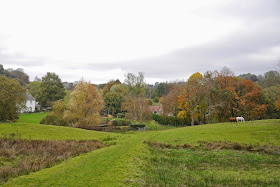Today, after quite a gap we are on the final leg of the Stour Valley Path. We set out from Manor Farm at Silton, pausing only to photograph the ancient oak tree and the kitch, but quite amusing, sheep.
We headed along the road, past the much restored church to turn left by the village hall and then make the dangerous crossing of the very busy A303. The path leads on across fields into the village of Bourton and then follows the line of the Stour due north.
Now the terrain changes, becoming much more hilly and interesting as we approached Pen Mill Farm.
After passing the farm you cross two small valleys, and in the second of these you get your last view of the mighty Stour.
The path then climbs across some very attractive country. Our Guidebook to the Stour Valley Way is very detailed and a bit quirky. At one point it says, having entered a field by a gate, "a used path goes straight up the hill ... Ignore it!". It continues with stern instructions to navigate to a point 82 degrees left of a telegraph pole. I dutifully did all this and reached the hedge at the top to find that the promised stile was no longer there. The solution of course was to go back some way and joint the "used path". Hmm.
This is the delightful view back from the top of the hill.
A lane and then a long field-edge path led to Bonham, where an interesting Manor House was studiously hidden behind a wall and a hedge. I learn from Pevsner that the churchy-looking part to the right was once a Roman Catholic chapel, and that the house has an Elizabethan plaster ceiling.
From here, it was short walk downhill through woodland to reach the edge of Stourhead's parkland. After walking along a track, the path veers right across fields and soon there is a first sight of the lake and one of the many garden buildings, the Temple of Flora.
The route now skirted the western edge of Stourhead and I gaily followed further instructions to turn right through an unmarked gate and follow a path uphill through woodland. There was in truth no detectable path and veering first left and then right in an effort to correct my line I ended up completely lost. I did eventually find my way into the main woodland and navigating with my OS map and glimpses of the lake I managed to stumble down to the end of the lake, with the Lily Pond and Six Wells Bottom on my left. It is here that the Stour gradually emerges from underground springs.
I headed on reach the Spread Eagle pub in Stourton where we met up with friends Judith and Tony for lunch, before having a very informative walk around the gardens, which were begun by Henry Hoare in about 1744.
This is the classic view of the gardens from the entrance near the pub. The Palladian Bridge is in the foreground and the Pantheon at the other end of the lake. The beautiful tree on the right is a Tulip Tree, named for the way their large flowers are thought to resemble tulips.
This is the truly wonderful view from the Pantheon back towards the Palladian Bridge.
Conditions: mild, cloudy.
Distance: about five miles on the SVP.
Guide: The new Stour Valley Path by Edward R Griffiths, Greenfield Books, 1998, but sadly out of print.
Maps: Explorer 129 (Yeovil & Sherborne) and 142 (Shepton Mallet & Mendip Hills West)
Rating: SVP section three stars; Stourhead five stars. Equalled only by Stowe.










No comments:
Post a Comment